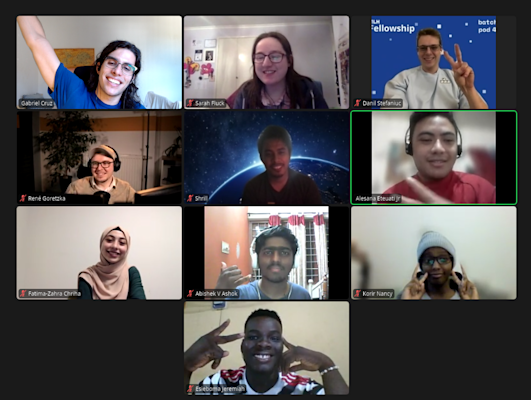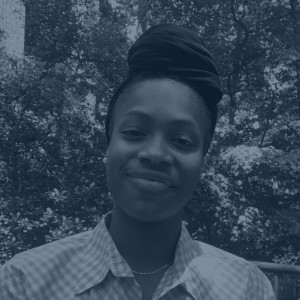Sarah Fluck, 24

While Sarah Fluck only recently burst into the hacking scene, she is already a force to be reckoned with. Initially earning her degree in English and Philosophy from the University of Southampton, it is clear she has always had an inquisitive mind. Getting into hacking wasn’t easy at first, especially while working a full-time job in general administration and with no formal educational background in coding. However, she says she “has always been technically minded” and always had a desire to understand the ins-and-outs of software development. So when the COVID-19 pandemic struck and Sarah found herself with significantly more time on her hands to dedicate to learning, she hit the ground running.
First teaching herself HTML and CSS using online resources such as W3Schools and Sololearn, she quickly moved on to JavaScript. Sarah admits it “felt like quite a big jump, and initially I didn’t think much of it as I found the syntax confusing and couldn’t understand how it would be genuinely useful.” But she persevered, dedicating countless hours to developing her skill set. To further improve her coding abilities, she signed up for an online computer science class, CS50: Introduction to Computer Science, offered through Harvard University. During this course, Sarah spent much of her time learning C, which gave her solid fundamentals with which to build projects in C++.
An expert at solo learning, Sarah soon discovered that one of the best ways to break into the programming community was “to make contributions to open-source projects.” Still new to the world of programming, Sarah wasn’t sure where to begin, but she found a great start when she accidentally “stumbled upon the MLH Fellowship from a random blog post which listed different ways to get into open-source”. Though she had low hopes of making it to the interview stage, she was pleasantly surprised when she not only made it to the interview stage but was accepted into the program itself. Sarah says finding that not “everyone in my pod was a CS student, some had different majors and some were also self-taught like myself,” reassured her that she had earned her place in the hacker community.
At her first hackathon, an orientation hackathon organized by MLH in the first week of her Fellowship, she and her team developed Owlhub, an app geared specifically for fellow coders to share their code. As part of the MLH Fellowship, she has contributed to Hermes, an open-source engine optimized for React Native, even further growing her skills in C++. Despite her self-described non-traditional background, Sarah has grown into her own in the hacker community. She has taken initiative at every opportunity, having informal Q&A sessions “with professional developers at major tech companies” and even forming a “study group with fellow students to practice leet code questions.” She earned her first professional role in software engineering in London earlier this year. “Had I not realized my passion for technology and to always be learning new things,” she says, “I might still be working in administration.”
Quick Facts

Sarah Fluck, 24

While Sarah Fluck only recently burst into the hacking scene, she is already a force to be reckoned with. Initially earning her degree in English and Philosophy from the University of Southampton, it is clear she has always had an inquisitive mind. Getting into hacking wasn’t easy at first, especially while working a full-time job in general administration and with no formal educational background in coding. However, she says she “has always been technically minded” and always had a desire to understand the ins-and-outs of software development. So when the COVID-19 pandemic struck and Sarah found herself with significantly more time on her hands to dedicate to learning, she hit the ground running.
First teaching herself HTML and CSS using online resources such as W3Schools and Sololearn, she quickly moved on to JavaScript. Sarah admits it “felt like quite a big jump, and initially I didn’t think much of it as I found the syntax confusing and couldn’t understand how it would be genuinely useful.” But she persevered, dedicating countless hours to developing her skill set. To further improve her coding abilities, she signed up for an online computer science class, CS50: Introduction to Computer Science, offered through Harvard University. During this course, Sarah spent much of her time learning C, which gave her solid fundamentals with which to build projects in C++.
An expert at solo learning, Sarah soon discovered that one of the best ways to break into the programming community was “to make contributions to open-source projects.” Still new to the world of programming, Sarah wasn’t sure where to begin, but she found a great start when she accidentally “stumbled upon the MLH Fellowship from a random blog post which listed different ways to get into open-source”. Though she had low hopes of making it to the interview stage, she was pleasantly surprised when she not only made it to the interview stage but was accepted into the program itself. Sarah says finding that not “everyone in my pod was a CS student, some had different majors and some were also self-taught like myself,” reassured her that she had earned her place in the hacker community.
At her first hackathon, an orientation hackathon organized by MLH in the first week of her Fellowship, she and her team developed Owlhub, an app geared specifically for fellow coders to share their code. As part of the MLH Fellowship, she has contributed to Hermes, an open-source engine optimized for React Native, even further growing her skills in C++. Despite her self-described non-traditional background, Sarah has grown into her own in the hacker community. She has taken initiative at every opportunity, having informal Q&A sessions “with professional developers at major tech companies” and even forming a “study group with fellow students to practice leet code questions.” She earned her first professional role in software engineering in London earlier this year. “Had I not realized my passion for technology and to always be learning new things,” she says, “I might still be working in administration.”
Quick Facts




